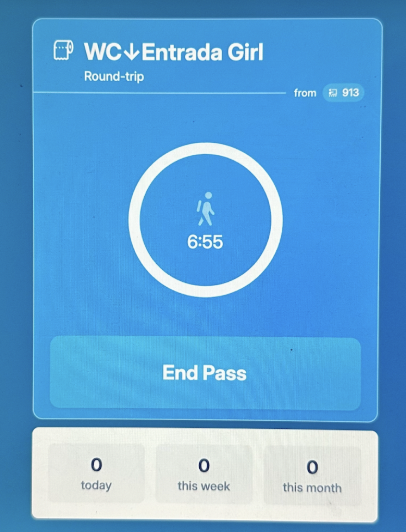
The school recently introduced a policy that requires students to sign out online using SmartPass before going to the bathroom. The administration says it’s to help monitor student movements, reduce class disruptions, and improve security. However, students have different opinions on the system’s effectiveness, with some finding it helpful, while others feel it limits their privacy.
The SmartPass system was put in place after students were seen misusing bathroom breaks, often to skip class or hang out with friends. While the policy aims to improve order and accountability, students feel it affects their freedom and privacy. This article will explore the reasons behind the policy and how students are reacting to it.
Matilda Orejuela, a 12th-grade student, shares her thoughts: “I think the administration put SmartPass in place because too many students were misusing bathroom breaks. We all know sometimes when we leave for the bathroom, it’s like an opportunity to escape from class. So we like to be in the bathroom for a lot of time.”
While Matilda understands why the school created the system, she also points out the frustrations that students have with it. Although the goal is to fix a problem, it has brought new challenges. Some students feel like the system limits their freedom and adds extra rules.
“I think they expect fewer students walking around the halls, more time spent in class, and a safer environment since it’s easier to track where people are,” Matilda adds.
The main goal of the policy is clear: stop students from walking the halls and make sure they spend more time in class. But while that seems like a simple solution, some students feel it takes away their personal space and freedom, which they think is a bigger issue.
Ismael Valentin, the high school vice principal, explains, “The reason for SmartPass is to control hallway traffic and keep track of when students are missing class, because we want to make sure you’re spending as much time in class as possible.”
Mr. Valentin explains that the policy’s main goal is to get students to stay in class, but students still feel like the system affects them in ways they didn’t expect. It’s about making sure students are safe and in class, but it’s also about how students experience it.
“I definitely think it’s annoying and an invasion of privacy. It feels ridiculous that if you don’t come back in seven minutes, someone will come look for you,” says Matilda. “But some students feel like the bathrooms are less crowded, so it can be beneficial too.”
While some students see the benefits, like fewer people in the bathroom, the time limit is causing frustration. The feeling of being watched or rushed by the system is a big concern for many, especially when they need more time than the limit allows.
“Some students feel embarrassed when they really need to go but can’t because the system says too many people are already out. That’s definitely a challenge…sometimes you really need more than seven minutes in the bathroom,” Matilda adds.
Matilda’s comment shows the pressure some students feel when they really need to use the bathroom but are forced to rush because of the system. This added stress brings up the question of whether the policy is actually helping students or just making things harder for them.
“SmartPass doesn’t use GPS data, doesn’t actually track students that way, but it does track hallway time. We don’t really know if you are where you’re supposed to be, but no one’s watching you in the bathroom,” Mr. Valentin explains.
Mr. Valentin clarifies that the system doesn’t track students in the bathroom but focuses on hallway time. While this may make some students feel better, the feeling of being monitored still affects how they view the system.
SmartPass is just one example of how technology is being used in schools to manage student behavior. While it’s meant to keep students safe and organized, it’s also important to think about how much control students should have over their own time and privacy. As more schools consider similar systems, they’ll need to figure out how to balance safety with students’ personal space.
In the end, SmartPass may help keep track of students and reduce disruptions, but whether it truly creates a better learning environment or just adds more stress is still up for debate.


